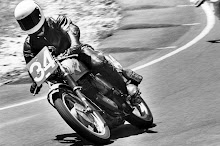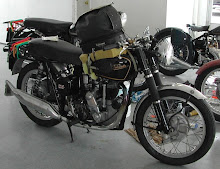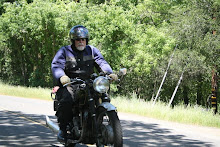
Allan Schafer of Grafton, a town in northern NSW, Australia as a young man was a prolific letter writer to overseas motorcycling "greats", this one is a reply to his letter together with an autographed photo. Allan wrote to Ernst Henne in Germany in 1936. It is interesting to note the swastika on the franking mark on the envelope that brought the reply.
Former BMW works driver and rider Ernst Henne died on Sunday May 24, 2005 at the age of 101.
In the 1920s and 1930s, he achieved endless victories, championships and speed records on two wheels; he was also on the list of winners of many international races on four wheels.`
Ernst Jakob Henne was born on 22.02.1904 as the fourth child of a master saddler in Weiler near Wangen im Allgäu. In 1919 he started his apprenticeship to become a motor vehicle mechanic, before becoming an independent motor cycle mechanic. In July 1923, he was amongst the starters in a motorcycle race in Mühldorf, almost by accident, and immediately achieved third place in his class on his first time out. In autumn 1925, he made his first major international appearance in the Monza Grand Prix, coming sixth in the 350 cc class.`
After this success, he signed a contract with BMW as a works rider. In 1926, he also became the official representative of BMW Motorcycles, and also became one of the original BMW automobile representatives. Ernst Henne achieved his first victory for BMW in May 1926 in the "Karlsruher Wildparkrennen". He came first in the Eiffel Race in the same year, thus also winning the German Championship, which was still decided in one race in those days.`
At the end of the 1920s, he was regarded as one of the best, most versatile motorcyclists in Germany.
He took part in the International Six Day Trial at the beginning of the 1930sand in 1933, 1934 and 1935 he won the team event with the national team, which was in actual fact a pure BMW team.`
Once the BMW Board of Management had given the go-ahead to attempt land speed record attempts, a super-charged engine, which had already been started, was fully developed. The frame was made in Henne's own workshop.`
On 19 September 1929, Henne chased the record for the first time with a 750 cc super-charged BMW, breaking eight world records that day. Not all of them were officially recognized, but the most spectacular stayed: at a speed of over 216 km/h, Ernst Henne was the fastest motorcycle rider in the world.
National pride was a big thing in those days…guess it still is today… riders from Great Britain also challenged for the World’s fastest on two wheels. Joe Wright OEC, Zenith, Eric Fernihough all made attempts and held records for periods of time.
Joe Wright OEC, Zenith, Eric Fernihough all made attempts and held records for periods of time.
In 1932, Henne reached 246 km/h in Hungary; on the new motorway in Frankfurt, he reached 256 km/h in 1935, and just one year later he achieved 272 km/h on a fully enclosed motorcycle. Because of its characteristic shape, the driver and his motorcycle soon became popularly known as "Henne and his egg".`
In 1936, he drove the first BMW 328 prototype in the Eiffel Race and not only won the normally aspirated 2 litre class , but also achieved the best time of all the sports cars that had started with an average speed of 101.5 km/h .
With the BMW 328, he then went on to win the Belgian Grand Prix des Frontières in Chimay and the Bucharest Grand Prix.`
 On the morning of 28 November 1937, Henne finally reached the high point of his career achieving an officially certified speed of 279 km with the "Egg", reaching 280 km/h on his return.
On the morning of 28 November 1937, Henne finally reached the high point of his career achieving an officially certified speed of 279 km with the "Egg", reaching 280 km/h on his return.
Ernst Henne then retired from record breaking, but his record remained unbroken until 1951.
After the Second World War, Henne developed a contract workshop for Mercedes-Benz vehicles and became one of the largest dealerships in Germany. His company became part of DaimlerChrysler AG in 1997. In 1991, he also founded, with a considerable proportion of his assets, the Ernst-Jakob-Henne Foundation. The aim of the foundation is to support people who are innocent victims of suffering.
Ernst Henne, who withdrew increasingly from public life in latter years, lived with his second wife in the Canary Islands from 1996 on until his death.
Acknowledgement is made to the BMW motorcycle Owners of America for information on Henne’s life.
In the 1920s and 1930s, he achieved endless victories, championships and speed records on two wheels; he was also on the list of winners of many international races on four wheels.`
Ernst Jakob Henne was born on 22.02.1904 as the fourth child of a master saddler in Weiler near Wangen im Allgäu. In 1919 he started his apprenticeship to become a motor vehicle mechanic, before becoming an independent motor cycle mechanic. In July 1923, he was amongst the starters in a motorcycle race in Mühldorf, almost by accident, and immediately achieved third place in his class on his first time out. In autumn 1925, he made his first major international appearance in the Monza Grand Prix, coming sixth in the 350 cc class.`
After this success, he signed a contract with BMW as a works rider. In 1926, he also became the official representative of BMW Motorcycles, and also became one of the original BMW automobile representatives. Ernst Henne achieved his first victory for BMW in May 1926 in the "Karlsruher Wildparkrennen". He came first in the Eiffel Race in the same year, thus also winning the German Championship, which was still decided in one race in those days.`
At the end of the 1920s, he was regarded as one of the best, most versatile motorcyclists in Germany.

He took part in the International Six Day Trial at the beginning of the 1930sand in 1933, 1934 and 1935 he won the team event with the national team, which was in actual fact a pure BMW team.`
Once the BMW Board of Management had given the go-ahead to attempt land speed record attempts, a super-charged engine, which had already been started, was fully developed. The frame was made in Henne's own workshop.`
On 19 September 1929, Henne chased the record for the first time with a 750 cc super-charged BMW, breaking eight world records that day. Not all of them were officially recognized, but the most spectacular stayed: at a speed of over 216 km/h, Ernst Henne was the fastest motorcycle rider in the world.
National pride was a big thing in those days…guess it still is today… riders from Great Britain also challenged for the World’s fastest on two wheels.
 Joe Wright OEC, Zenith, Eric Fernihough all made attempts and held records for periods of time.
Joe Wright OEC, Zenith, Eric Fernihough all made attempts and held records for periods of time.In 1932, Henne reached 246 km/h in Hungary; on the new motorway in Frankfurt, he reached 256 km/h in 1935, and just one year later he achieved 272 km/h on a fully enclosed motorcycle. Because of its characteristic shape, the driver and his motorcycle soon became popularly known as "Henne and his egg".`
In 1936, he drove the first BMW 328 prototype in the Eiffel Race and not only won the normally aspirated 2 litre class , but also achieved the best time of all the sports cars that had started with an average speed of 101.5 km/h .
With the BMW 328, he then went on to win the Belgian Grand Prix des Frontières in Chimay and the Bucharest Grand Prix.`
 On the morning of 28 November 1937, Henne finally reached the high point of his career achieving an officially certified speed of 279 km with the "Egg", reaching 280 km/h on his return.
On the morning of 28 November 1937, Henne finally reached the high point of his career achieving an officially certified speed of 279 km with the "Egg", reaching 280 km/h on his return.Ernst Henne then retired from record breaking, but his record remained unbroken until 1951.
After the Second World War, Henne developed a contract workshop for Mercedes-Benz vehicles and became one of the largest dealerships in Germany. His company became part of DaimlerChrysler AG in 1997. In 1991, he also founded, with a considerable proportion of his assets, the Ernst-Jakob-Henne Foundation. The aim of the foundation is to support people who are innocent victims of suffering.
Ernst Henne, who withdrew increasingly from public life in latter years, lived with his second wife in the Canary Islands from 1996 on until his death.
Acknowledgement is made to the BMW motorcycle Owners of America for information on Henne’s life.
Left click on images to enlarge.









No comments:
Post a Comment